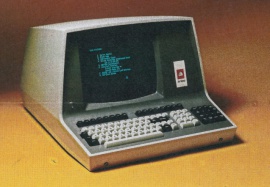Difference between revisions of "Beehive B100"
m (control sequences) |
m (infobox) |
||
| Line 8: | Line 8: | ||
| interface = RS-232C | | interface = RS-232C | ||
| interface2 = 20 mA current loop | | interface2 = 20 mA current loop | ||
| − | | baud_rates = 75, 110, 150, 300, 600, 1000, 1200, 1800, 2000, 2400, 3600, 4800, 7200, 9600, 19200 | + | | baud_rates = 75, 110, 150, 300, 600, 1000, 1200, 1800, 2000, 2400, 3600, 4800, 7200, 9600, 19200 |
| + | | char_matrix = 5x7 | ||
| + | | char_cell = 7x9 | ||
| + | | display_size = 12-inch | ||
| + | | char_resolution = 80x24 | ||
| + | | char_resolution2 = 80x12 | ||
| + | | refresh_rate = 60 | ||
| + | | refresh_rate2 = 50 | ||
| + | | cpu = Discrete Logic | ||
| + | | ram = | ||
}} | }} | ||
The {{PAGENAME}} terminal was introduced in June, 1976 for $1,495.{{Computerworld | The {{PAGENAME}} terminal was introduced in June, 1976 for $1,495.{{Computerworld | ||
Revision as of 03:17, 26 January 2013
| Beehive B100 | |
|---|---|
 | |
| Manufacturer | Beehive |
| Model | B100 |
| Lifetime | |
| Introduced | July, 1976 |
| Introductory Price | $1,495 |
| Communication | |
| Interfaces |
RS-232C, 20 mA current loop |
| Baud Rates | 75, 110, 150, 300, 600, 1000, 1200, 1800, 2000, 2400, 3600, 4800, 7200, 9600, 19200 |
| Display | |
| Size | 12-inch |
| Refresh Rates | 60 Hz, 50 Hz |
| Character Modes | |
| Resolutions | 80x24, 80x12 |
| Matrix | 5x7 |
| Cell | 7x9 |
| Firmware | |
| CPU | Discrete Logic |
| Code Chart | Beehive B100 |
The Beehive B100 terminal was introduced in June, 1976 for $1,495.[1][2]
The design of the B100 was similar to the Lear Siegler ADM-3A and was created by engineers who left LSI to form Soroc Technology.[3]
Manx
References
- ↑ "Few Products Announced for Large System Users", Computerworld, June 14, 1976, pg. 4
- ↑ "Beehive Designs Terminal For users on Budgets", Computerworld, July 5, 1976, pg. 16
- ↑ "Lear-Siegler Terminal". http://www.old-computers.com/site/header/terminal.asp. Retrieved March 15, 2012.